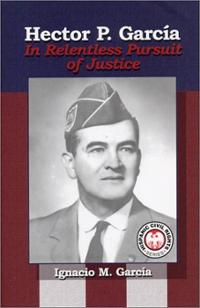

In 1948, Three Rivers Funeral Home refused burial of the remains of Felix Longoria, a World War II veteran. For Dr. Hector P. García this incident was an example of the bigotry and injustice that many Mexican Americans suffered in South Texas and throughout the U.S. He and his fledgling organization, the American G.I. Forum, stepped into the national consciousness to fight for Longoria and his family and to inspire Mexican American participation in party politics and against segregation in the post-World War II years.
García was an immigrant from Tamaulipas, Mexico, whose family journeyed north in the fashion of so many other immigrant families seeking economic opportunities and safety from the numerous revolutionary conflicts. In spite of discrimination and poverty common in the Rio Grande Valley, García became a physician in 1940 and, like many young Mexican Americans, served his adopted country with distinction in fighting fascism and injustice abroad. After receiving the Bronze Star and six battle stars, he returned to Texas only to find that much of the discrimination and segregation against Mexican Americans was still rampant, despite their having proved themselves on the bloody battlefields overseas.
An outraged García went on to rally Mexican-American veterans into one of the most effective civil rights organizations in history and to create a space for them within the political process. His pioneering efforts not only resulted in changed laws and practices, but also in a new awareness among Mexican Americans that they could fight for their rights and win. He proved to be a decisive factor in the election of America's first Catholic president, John F. Kennedy. His activism inspired a new generation of social reformers in the barrio and a reluctant acceptance that Mexican Americans were first class citizens. For his work, he was awarded the Medal of Freedom in 1984.